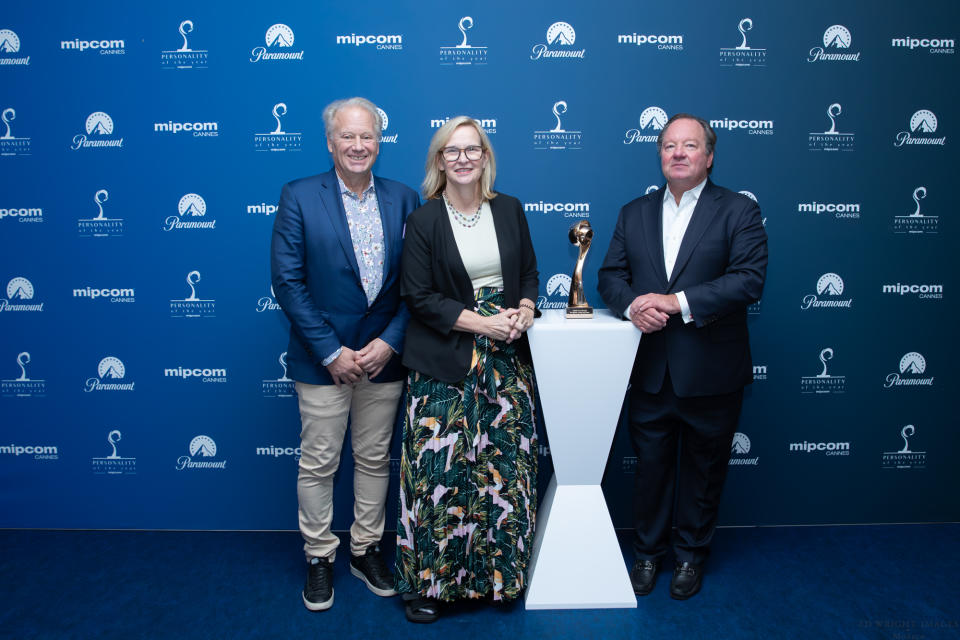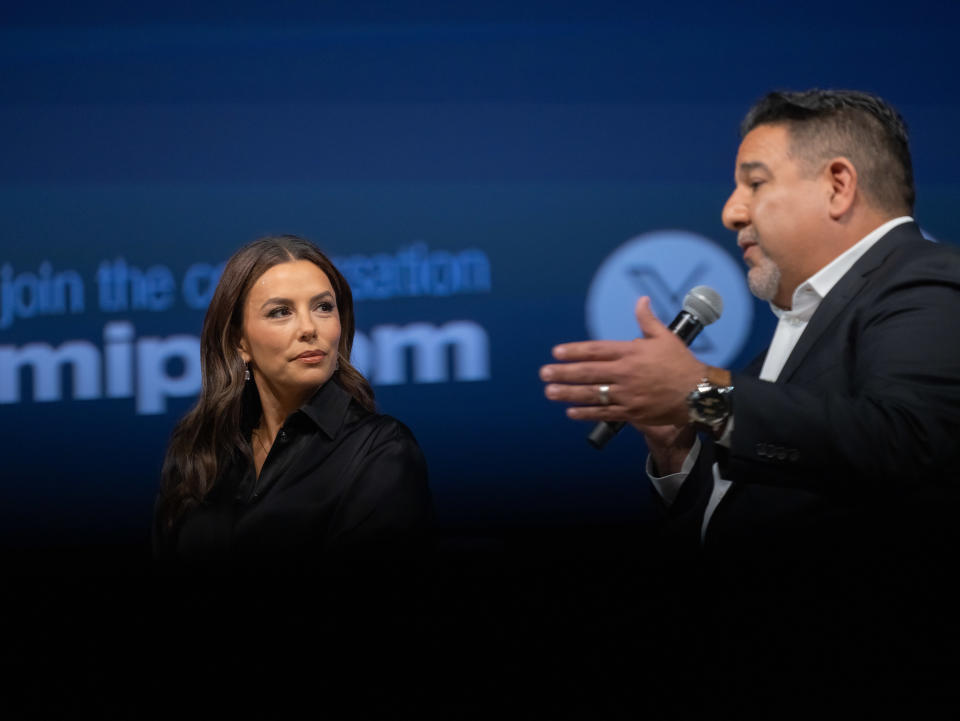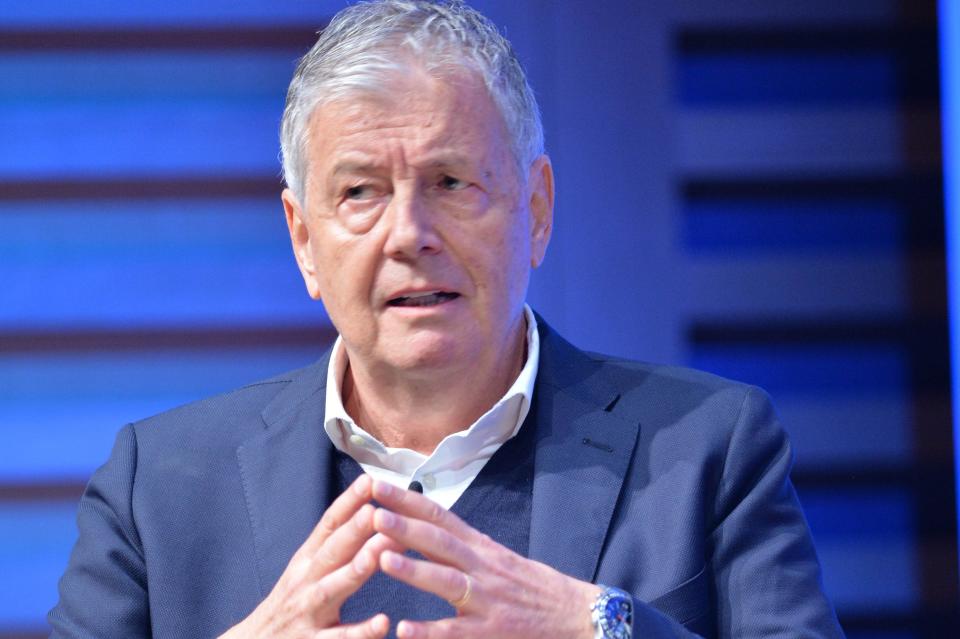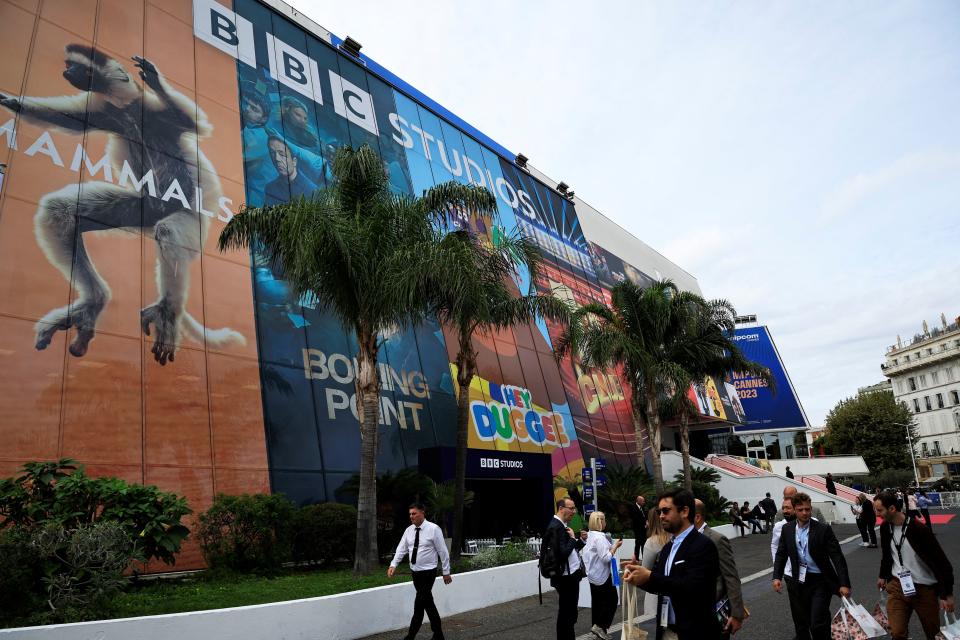Mipcom Cannes Takeaways: Industry Wrestles With Future, Eva Longoria Stars, WBD Max Rollout & All The Biggest Deals
- Oops!Something went wrong.Please try again later.
- Oops!Something went wrong.Please try again later.

Another Mipcom is nearing the finish line, with tired and weary sales execs catching their flights or following up on leads from the comfort of their own homes or offices today. Set against a backdrop of ongoing labor action in the U.S. and a European TV sector hit hard by recession, the annual Cannes confab was billed as one that would prove content licensing was back with a bang (more on that below) and there was evidence of this on the ground. The focus on co-productions and emerging technologies such as AI and FAST channels also pointed to a mixed ecology for international TV, as sales houses looked for new ways to distribute their content. There was much talk of how the era of content mega-spend is over, with expensive limited miniseries not expected to be a key focus for streamers going forwards. (All hail the return of the lower-cost, returnable). Here, we’ve boiled down the key trends and talking points from telly’s biggest get-together.
Correction & contraction

It was all anyone could talk about really. As buyers sniffed out the best deals and sellers gathered to flog their wares, there was an across-the-board recognition that never again will the market be able to sustain the mass proliferation of content that hit the TV industry in the early part of this decade. With market correction comes falling budgets and content licensing has only become more crucial (remember the forecasted death of distribution?), attendees said time and time again, reiterating the importance that Mipcom plays in the annual TV calendar. Paramount boss Bob Bakish (above right) used his Personality of the Year acceptance speech to passionately reaffirm the Yellowstone giant’s commitment to content licensing. “While our peers were pulling back content and putting up walled gardens, we never left,” he said. BBC Studios distribution boss Rebecca Glashow, meanwhile, was bullish in the face of the contraction, positing that “moments like this are when creativity comes back for the industry” on a panel alongside content boss Ralph Lee. Those Deadline spoke with in private were perhaps a little less bullish, with many uncertain about the futures of their respective local production businesses and the wider international TV sector. With the actors strike rumbling on, there was a general feeling of concern that buyers are rowing back to the extent that the production sector may have to quite dramatically shrink, while commissioners’ current penchant for risk aversion was repeatedly raised as “problematic.” The death of the high-end limited series was floated by many, as buyers stressed the need for populist content that can be returnable at a decent price point. The phrase “escapist content” was uttered to us more than once. This also follows the line we’ve heard several times over recent months that while the labor strikes could have alerted U.S. producers to the cheaper costs of shooting in Europe, it hasn’t actually played out that way. On a Deadline-chaired panel yesterday, The X Files EP Frank Spotnitz said budgets had become “obnoxious” in recent years following the entrance of the streamers, as he communicated fears that recent industry diversity gains could be impacted by these shifts. There was a sense, from producers, that they will need to hold firm and ride this out, with commissioning levels over the coming 12 months very hard to predict.
More from Deadline
International Insider: Conflict Week Two; Big Questions At Mipcom; Saudi Setback
Roku Greenlights Second Seasons Of 'Reptile Royalty', 'UFO Cowboys' & 'Lincoln Log Masters'
Eva the professional

Delegates crammed into the Grand Auditorium on Monday afternoon to catch sight of Desperate Housewives actress, producer and activist Eva Longoria, who used her keynote alongside Banijay Americas Chair Cris Abrego to announce a Banijay-backed venture, Hyphenate Media Group. The name represents the multi-hyphenate working lives of its owners — Longoria referred to herself as a “producer-director who fell into acting,” while Abrego is known for his formational role in Hollywood-made reality TV, C-suite roles and as a best-selling author. “That multi-hyphenate is not surviving in Hollywood because the industry wants you to stay in your lane, particularly women,” said Longoria of why she launched the new biz. “I realized it’s not just me who feels this way. I know creators who are being suffocated by the system so Hyphenate will create the ultimate model.” Abrego remains in his role at Banijay, which brought dozens of top-level execs to Cannes, and will divide his time between the jobs. Hyphenate has also consolidated Longoria’s UnbeliEVAble Entertainment into the fold. On stage, the pair used the word “hyphenate” a dizzying amount of times, with Abrego explaining that both have had to duck and weave through Hollywood to become two of the town’s highest profile Latino entertainment figures. Elsewhere, the ever-captivating EbonyLife CEO Mo Abudu touched on similar themes of othering when she called out commissioners for refusing to consider African stories — and, by extension, budgets — in the same breath as those from the U.S. and Europe.
To the Max

At Deadline Towers at least, there had been real anticipation about Gerhard Zeiler’s Monday Morning Media Mastermind address. Appearing alongside EMEA streaming chief Leah Hooper Rosa, the Warner Bros. Discovery (WBD) President of International came into his talk off the back of a series of top-levels management departures and with the industry itching to learn when they could expect Max to replace HBO Max internationally. Zeiler dealt with the second point in detail but not the first. He revealed 22 Max launches in Europe next year (these territories already have HBO Max) along with a second wave later in 2024 that will include France and Belgium. Zeiler also touched on synergies. When Warner Bros and Discovery merged, David Zaslav talked about $3B in savings through synergies, and though the company has faced huge criticism for thousands of redundancies, yanking shows off of streamers and cancelling film releases to service that strategy, the figure has steadily risen. Zeiler, somewhat provocatively, revealed the $3B figure was now “on the way” to $5B, adding: “Who knows where we will end up?” However, there was nothing was said on the exits of Priya Dogra, Robert Blair and others in Europe, which was somewhat surprising given the high-profile nature of these departures.
Kids are alright

Never has owning recognizable IP been more important, and in few genres is IP more important than in children’s. With a well-attended Mip Junior once again preceding the main confab, multiple sources told Deadline they were eager to push into the sometimes-lucrative kids content game, and execs from the likes of Candle Media-backed Cocomelon outfit Moonbug spoke confidently. The recent rejig in streamer focus from subscriber growth to retention is a boon for kids content, one producer suggested. “Now it’s all about keeping families on the platform, and you need a strong children’s library to do that,” they added. Recent moves from some of the European majors in this space have been intriguing. Just prior to Mipcom, Studiocanal promoted TV boss Françoise Guyonnet to CEO Copyrights Group and EVP Kids’ Brands, signaling a move into children’s IP, while BBC Studios’ Lee and Glashow talked up the outfit’s recent decision to commercialize its kids production outfit. “Broadcasters and commissioners are falling back behind known IP,” added Lee of the thinking behind the decision. Kids IP is certainly known, and it appears we’ll be hearing plenty more from this section of the market over the coming months.
Deals & projects
Mipcom has changed a fair bit over the years and TV deals really have become a 365-days-per-year business but that doesn’t mean there weren’t some juicy handshakes and buzzy projects for delegates to their teeth into through the early part of the week. Leading the charge, we revealed James Franco-starring MENA TV series penned by Shades of Blue scribe Adi Hasak. On Sunday, we told you about Beach House Pictures doc Lost and Banijay Rights taking on Shine director Scott Hicks‘ projects about musician Ben Folds. Mediawan struck European deals for high-profile premiere series Zorro, Fremantle did similar for Channel 4 format The Piano and Planet Earth III sold to Australia. Perhaps the most fun market project doing the rounds was our exclusive on The Wombles being remade for TV, while we also brought news of Fast & Furious star Sung Kang’s The Ride Life doc series, a feature on Israel’s Supernova Music festival – site of the October 7 massacre – and Vix’s Todo Lo Que Fuimos. Plenty more here.
By the numbers

According to organizer RX France, the 39th edition of the international sales and co-pro market attracted 11,000 executives from 100 countries, up by 200 from the 2022 figure. It’s always hard to know exactly how accurate figures like this are with an event of this scale, but it’s impossible to deny there wasn’t buzz and activity around non-stop. Keynotes were well attended and occasionally standing-room only but some still have seating sections closed off to fill space closer to speakers. Crucially, RX noted more than 3,500 buyers were in town, which is important given all the talk around the return of third-party sales and co-pros. “Given the buzz from the stands, what the leaders have said on stage, and the sheer volume of content deals done, it is clear that third party sales and distribution are back,” was the way Mipcom Cannes Director Lucy Smith put it in a statement. “That concentration of activity in one place, at one time, can only be a catalyst to the international market overall,” she added. One criticism we heard on the ground from several sources was a perceived lack of U.S. companies present — though with the likes of Paramount and NBCUniversal coming out in force, and Disney back on the block in a more visible way, RX might push back against that. Deadline also understands Netflix sent a small delegation, who kept fairly under the radar. The company can also point to its statistic that U.S. buyers made up the largest chunk, followed by the UK, France, Germany and Spain. Other numbers to chew on: More than 320 companies exhibited in and around the Palais des Festivals, including 31 pavilions (50 made their market debuts). China sent its biggest delegation since 2019 as it was named Country of Honour, comprising more than 300 delegates from 40 companies. Middle Eastern participation was up 50% year-on-year, a surprising stat given Israeli companies didn’t attend due to the ongoing conflict there, but we hear there was more presence from Turkey, the UAE and the wider GCC region offsetting that fall. Security was tight with France on high alert following the murder of a school teacher following the Hamas-led attack on Israel, and queues to enter the Palais often snaked well back towards the marina. As Deadline headed out of town, eight airports (six when at the time of reporting yesterday) including the Cannes-friendly Nice, were evacuated as security threats were identified. Smith addressed the conflict just prior to Zeiler’s Monday keynote, saying her heart goes out to the thousands who have died and stressing the additional security.
Best of Deadline
SAG-AFTRA Interim Agreements: Full List Of Movies And TV Series
2023 Premiere Dates For New & Returning Series On Broadcast, Cable & Streaming
Sign up for Deadline's Newsletter. For the latest news, follow us on Facebook, Twitter, and Instagram.

